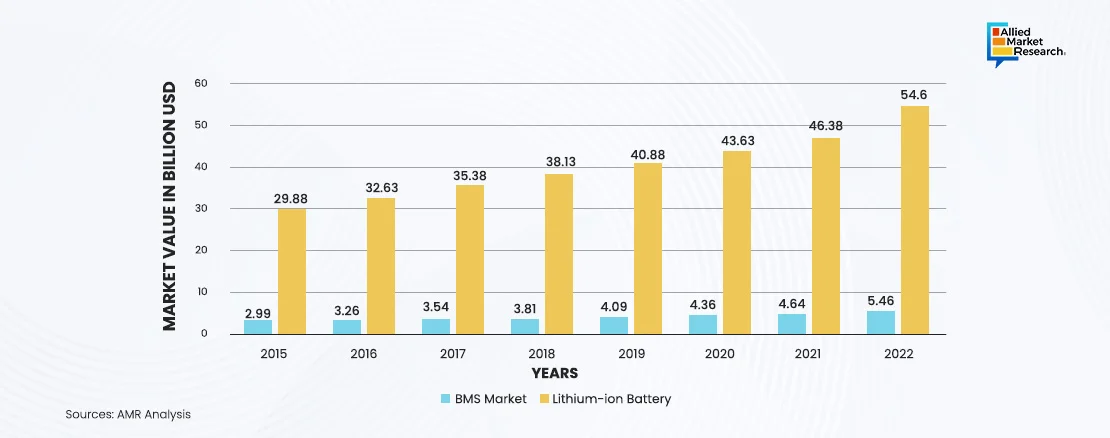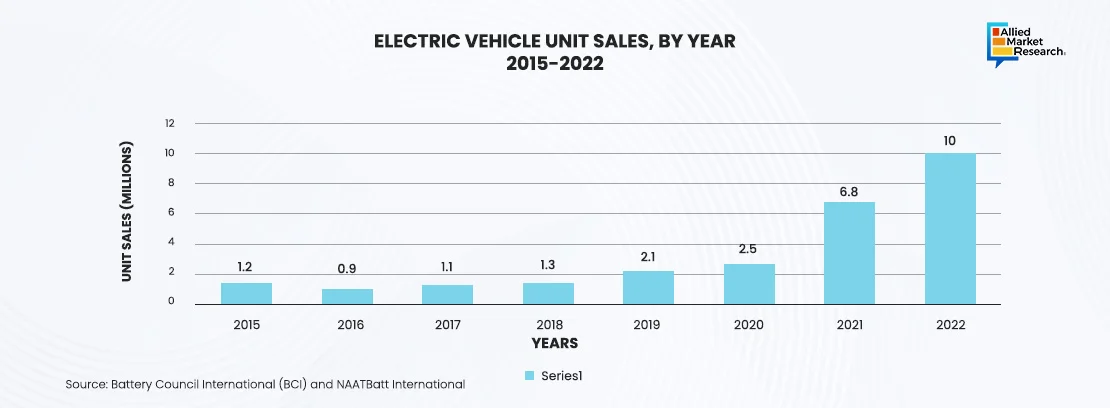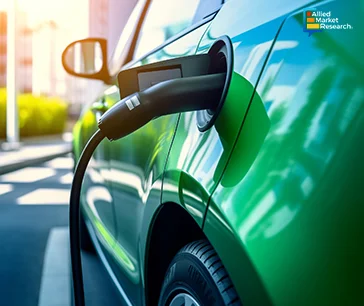Table Of Contents
- Transforming Energy Storage and Efficiency - The Evolution of Battery Management Systems
- Electric Vehicle Sales Surge, Fueling Battery Management System Growth
- Interaction of Battery Management Systems into Renewable Energy Storage
- Revolutionizing EV Performance and Safety
- Case Study: Optimizing Battery Life and Performance with Advanced BMS in Electric Buses
- Final Lines

Onkar Sumant

Koyel Ghosh
Transforming Energy Storage and Efficiency - The Evolution of Battery Management Systems

Transforming Energy Storage and Efficiency - The Evolution of Battery Management Systems
Modern battery-powered applications, such as electric vehicles, renewable energy storage systems, and portable electronics, heavily rely on Battery Management Systems (BMS). These systems monitor voltage, current, and temperature to optimize battery performance and prevent overcharging and overheating, ensuring operational safety. BMS enhances battery life by improving charge-discharge cycles and integrates with smart technologies like the Internet of Things for predictive maintenance. This integration supports fast-charging in EVs, minimizes energy losses, maximizes battery utilization, and boosts energy efficiency. Consequently, BMS contributes to a cleaner energy future, environmental sustainability, and an improved user experience across various industries.
Integrating Battery Management Systems is important for ensuring the security, efficiency, and dependability of lithium-ion batteries. CATL debuted their newest BMS generation on January 12, 2023. The new system is built using artificial intelligence algorithms and cloud connectivity, which will improve performance and extend the life of lithium-ion batteries in electric cars and energy storage systems. The growing demand for lithium-ion batteries will certainly have a substantial impact on the BMS sector as demand for electric vehicles and renewable energy storage increases. As battery packs are getting more powerful, they need better battery management systems to perform well in different conditions.

The ongoing evolution of battery technology, which necessitates smarter and more robust battery management systems, is expected to significantly expand the market valuation in the near future. The rising demand for electric vehicles and renewable energy storage is increasing the need for advanced battery management systems. Also, advances in battery technology are driving the development of smarter, more robust BMS, leading to significant market growth. For example, Tesla's Powerwall home battery system relies on an advanced BMS to manage energy flow and enhance battery performance, highlighting the significant role of BMS in modern energy storage.
Electric Vehicle Sales Surge, Fueling Battery Management System Growth
The exponential surge in electric vehicle sales from December 2015, when they stood at 1.2 million units, to December 2022, when they achieved an astonishing ten million units, has increased the importance of battery management systems. These devices are essential for ensuring the safety, efficiency, and performance of sophisticated EV battery packs. Tesla's advanced BMS dynamically monitors individual voltages, temperatures, and state of charge within its electric vehicles. By adjusting these parameters in real-time, the BMS enhances efficiency and extends battery life, ensuring safe operation and a seamless driving experience.

In addition, in 2024, General Motors (GM), a leading developer, announced a partnership with Analogue Devices to build a next-generation wireless battery management system (wBMS) for its forthcoming Ultium-powered EVs. By eliminating costly wiring connections, this unique method decreases overall weight and manufacturing complexity while increasing the flexibility and scalability of the battery pack design. GM's wireless Battery Management System (wBMS) will monitor cell voltage differences and temperature variations without the need for wired connections. This innovation enhances battery performance, safety, and longevity, addressing the industry's growing demand for efficient and reliable battery management solutions.
Interaction of Battery Management Systems into Renewable Energy Storage
The increased dependence on renewable energy has led to the rise in development and deployment of advanced BMSs for efficient and reliable operation of energy storage systems. On April 25, 2024, Eaton, a global power management company, launched its new Power Xpert Energy Storage System with an integrated BMS that improves battery performance, increases life cycle, and protects renewables from harm during their application. This system is intended for use in large-scale grid as well as commercial & industrial applications and employs real-time data analytics to keep an eye on and manage individual cells so that they do not overheat or get too hot when charging.
In recent years, there has been a significant increase in the integration of renewable energy systems with BMS, which facilitates the seamless incorporation of intermittent sources like solar and wind power into the grid. Efficient management of battery charging and discharging cycles optimizes energy use, enhancing the effectiveness of renewable energy sources. This approach reduces dependence on fossil fuels and boosts the reliability and resilience of the power grid.
Aside from Eaton's Power Xpert Energy Storage System, a number of other companies are developing new BMSs for renewable energy applications. Tesla's Powerwall, for instance, is a residential battery system that employs an advanced BMS to govern the flow of energy and optimize battery efficiency. Similarly, Sonnen's ecoLinx is a smart energy management system that combines solar power, battery storage, and energy management on a single platform using a BMS. The future of renewable energy is based on sophisticated BMS technology. As the world is moving toward a more sustainable and clean energy future, battery management systems are expected to play an important role in ensuring that renewable energy systems function efficiently, reliably, and safely.

Revolutionizing EV Performance and Safety
On July 10, 2024, Tesla unveiled its latest battery management system, a high-end technology that is set to transform the EV industry. This new BMS now comes with some advanced features such as real time cell monitoring, intelligent thermal management, and predictive maintenance capabilities in Tesla’s latest models. These improvements are expected to significantly improve Tesla electric cars’ performance range and safety. The new battery management system from Tesla offers several key improvements. It extends battery life and reduces degradation, enhances safety with advanced monitoring and control, speeds up charging with smart technology, and provides valuable data on battery health and performance. This next-generation BMS has impressed both the automotive and energy industries, highlighting the crucial role of BMS in the evolving field of renewable energy storage and electric vehicles.
BMS Improves Efficiency: Innovations in the SystemThe battery management system is rapidly evolving, driven by intense competition and a relentless pursuit of technological innovation. Established players with substantial financial and technical resources are leveraging their expertise to maintain a competitive edge. Emerging companies are driving innovation to meet the growing demands in the EV industry and beyond.
In June 2023, CATL, a top global battery maker, introduced its latest BMS. This new BMS offers enhanced safety, improved energy efficiency, and faster charging. It addresses the growing need for safe and efficient batteries as well as the demand for quick-charging electric vehicles. By partnering with major car manufacturers, CATL aims to boost the growth of electric transportation and support sustainability. These collaborations are expected to speed up the development and adoption of EVs, driving innovation and setting new industry standards.
BYD, a well-known Chinese automobile and battery company, brought forth their "Blade Battery" technology in April 2023, coupled with an upgraded BMS. This was a big step in making electric cars safer and more efficient. Combining the Blade Battery's unique cell-to-pack (CTP) architecture with the BMS's intelligent management capabilities improves energy density and overall battery performance while prioritizing safety. For EVs to become widely adopted, safety is crucial for both customers and manufacturers. Traditional lithium-ion batteries can have issues with thermal runaway, but the Blade Battery is a safer and more reliable alternative.
Furthermore, BYD’s advanced BMS provides real-time monitoring and data analytics for optimizing battery performance and prolonging its life cycle. BYD’s competitive position in the EV industry is anticipated to be strengthened through innovation in both battery architecture and management systems. This is because BYD has been addressing major challenges including energy density, safety, and efficiency that contribute to global transition into clean transport alternatives. The company's efforts highlight the importance of continuous innovation in achieving a sustainable and electrified future.
Case Study: Optimizing Battery Life and Performance with Advanced BMS in Electric Buses
Background: CityTransit, a major metropolitan transit provider, had significant issues with its fleet of electric buses, including variable performance, reduced range, and early battery degradation. As a result, these issues had a significant impact on the efficiency and reliability of their operations, causing them to incur additional expenditures and dissatisfied clients.
Challenges: CityTransit encountered three key challenges. The first was variation in battery performance across the fleet, which meant that certain buses had to charge more frequently or travel less distance, affecting route schedule planning. The second one was connected to the rapid degradation rate of some batteries, which caused certain cells to lose capacity quickly, resulting in higher replacement costs. Finally, CityTransit's operators did not have access to individual battery health and performance information, making it difficult to recognize early warning indications and take appropriate preventive measures before failure occurred.
Solution: CityTransit collaborated with a leading BMS provider to implement a sophisticated battery management system. This system can continuously monitor metrics such as voltage, temperature, and state-of-charge for individual batteries, rather than the entire fleet. This provides real-time insights into battery health, helping to detect potential issues earlier. Moreover, machine learning algorithms were utilized to investigate battery data and anticipate possible failures thereby, enabling a pre-emptive maintenance program that can avoid expensive mechanical problems. BMS also regulated the charge of every battery, which shortened charging time, reduced stress on the cells, and enhanced battery life and performance. The system’s cloud connectivity allowed CityTransit to remotely access battery data and analytics, enabling real-time fleet monitoring and better operational decisions.
Benefits: Multiple benefits accompanied the adoption of the sophisticated BMS solution. Optimizing charging and detecting faults early significantly boosted battery performance, leading to longer driving ranges, quicker recharge times, and lower battery replacement costs. The BMS's real-time monitoring and analytics enabled CityTransit to optimize its routes and schedules, improve fleet management, and reduce downtime in the event of battery failure.
Final Lines
Advanced Battery Management Systems have revolutionized how we manage and optimize battery power across various applications. Electric vehicles, renewable energy storage systems, and other innovative applications rely heavily on lithium-ion batteries. Improvements in BMS, such as real-time monitoring, predictive maintenance, and intelligent charging algorithms, result in not just lower energy and environmental losses, but also improved battery performance. Tesla, General Motors, and others have established new standards for battery management in terms of efficiency, reliability, and safety, mandating the expansion of BMS for a sustainable energy future and electric mobility.
Allied Market Research serves as a trusted partner for vendors in the battery management system market, providing tailored strategies to maximize the effective utilization of BMS technologies across diverse sectors. From residential and commercial applications to public infrastructure, educational institutions, industrial sectors, and beyond, AMR offers expertise and support to businesses aiming to explore the nitty-gritty of BMS technologies.
AMR delivers in-depth insights into leading BMS manufacturers, their strategic initiatives, and key developments, helping vendors to make informed decisions and stay competitive in the evolving BMS landscape.
For detailed information on the latest technologies, innovations, and market dynamics shaping the BMS industry, contact our specialists today!

